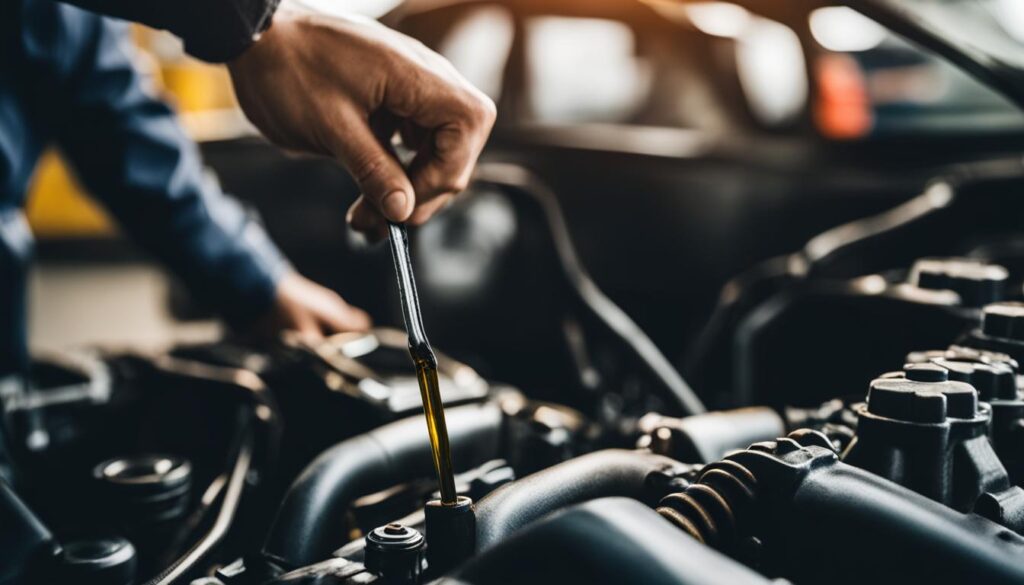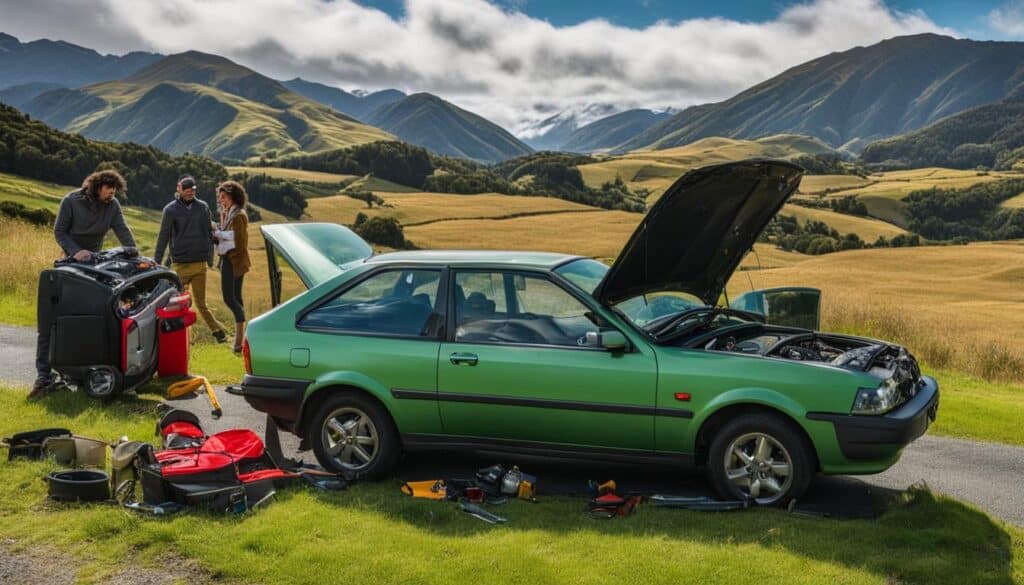Buying a car in New Zealand requires careful consideration and research. Whether you’re buying from a private seller or a dealer, there are important factors to keep in mind to ensure you get a reliable and value-for-money vehicle. In this guide, I will provide you with top tips for buying and maintaining used cars in NZ. From setting a budget and researching car valuations to understanding the importance of safety features and considering fuel efficiency, these tips will help you navigate the pre-owned vehicle market with confidence.
Key Takeaways:
- Set a budget and research car valuations to determine the right price range.
- Explore car financing options and compare interest rates to find the best deal.
- Consider important factors like safety ratings, fuel efficiency, and your specific needs when buying a used car.
- Thoroughly research the make and model of the car you’re interested in to understand potential issues and maintenance requirements.
- Know your rights under the Consumer Guarantees Act and consider buying from a dealer for added protection.
Get a Car Valuation to Determine the Right Price
Before you start searching for a used car, it’s important to determine the right price range. To help you with this, there are several car valuation tools available online. Trade Me’s Value My Car and BestCar are two free tools that can provide you with an estimate of a car’s value. Additionally, MotorWeb and CarJam offer paid valuation and vehicle history reports. These tools can give you a better understanding of the fair price range for the car you’re interested in, helping you avoid overpaying or offering too much.
By using car valuation tools, you can gather valuable insights into the market value of the specific make and model you’re considering. This information is crucial when negotiating the price with a seller, ensuring you pay a fair amount for the used car.
Trade Me’s Value My Car and BestCar are user-friendly platforms that let you input details about the car, such as its make, model, year, mileage, and condition. Based on this information, the tools generate an estimated value range for the vehicle. This gives you a starting point for negotiations and a benchmark against which you can compare asking prices.
If you want a more comprehensive valuation, MotorWeb and CarJam provide paid reports that include additional information, such as the vehicle’s history, ownership records, and any reported accident or damage history. This can be especially valuable when purchasing a used car, as it helps you assess the overall condition and potential risks associated with the vehicle.
When using car valuation tools, it’s important to consider that the estimated value is just a guide and should be used in conjunction with other factors, such as the car’s condition, mileage, service history, and market demand. It’s also a good idea to consult multiple valuation tools to get a broader picture and ensure accuracy.
Overall, car valuation tools are essential resources for determining the right price range for a used vehicle. They empower you as a buyer by providing insights into market values, allowing you to make informed decisions and negotiate with confidence.
Benefits of Using Car Valuation Tools:
- Get an estimate of a car’s value
- Understand the fair price range for a specific make and model
- Avoid overpaying or offering too much
- Negotiate with confidence
- Access additional information through paid reports
- Assess the overall condition and potential risks associated with a used car
With car valuation tools, determining the right price for a used car becomes easier and more accurate. Take advantage of these resources during your car buying journey and ensure you get the best value for your money.
Consider Your Car Financing Options
If you’re planning to finance your used car purchase, it’s important to explore your options and find the best deal. Consider these tips to ensure you make the most informed decision:
- Research car loan lenders: Simplify Loans, Better Finance, and Lending Crowd are three reputable car finance lenders in New Zealand. They consistently offer fair interest rates to borrowers, making them worth considering for your car financing needs.
- Contact lenders: Reach out to these lenders to see what interest rates they can offer you. This will help you gauge the affordability of the loan and determine if it fits within your budget.
- Compare offers: Don’t settle for the first loan offer you receive. Take the time to compare different options to find the most cost-effective choice with low interest rates and favorable terms.
Keep in mind that the interest rate you agree to now can make a significant difference in your car loan repayments. By carefully considering your car finance options, you can secure a loan that aligns with your financial goals and ensures a smooth ownership experience.
| Lender | Interest Rate | Loan Term | Minimum Loan Amount |
|---|---|---|---|
| Simplify Loans | 3.45% | 1-7 years | $5,000 |
| Better Finance | 4.12% | 2-6 years | $10,000 |
| Lending Crowd | 4.65% | 1-5 years | $20,000 |
Table: Comparison of Car Loan Lenders in New Zealand
8 Things to Consider When Buying a Used Car
When buying a used car, there are several important factors to consider. By taking these factors into account, you can make an informed decision and choose a car that suits your needs and budget.
- Used Car Cost: One-year-old cars are significantly cheaper than new cars due to depreciation. Consider your budget and research the average cost of used cars in your area.
- Safety Ratings: Check the safety ratings of the car you’re interested in. Look for high crash test ratings and advanced safety features to ensure your peace of mind on the road.
- Fuel Efficiency: Consider the fuel efficiency of the used car. Look for models that offer good mileage to save on fuel costs in the long run.
- Manual vs Automatic: Decide whether you prefer a manual or automatic transmission. Manual transmissions offer more control, while automatic transmissions are easier to drive.
- Electric and Hybrid Cars: Explore the option of electric and hybrid cars for their environmental benefits and potential long-term cost savings on fuel.
- Car Insurance Costs: Research car insurance costs for the models you’re considering. Some cars may have higher premiums due to their repair costs or theft rates.
- Best Time to Buy a Used Car: Be aware of the best time to buy a used car to get the best deals. Many experts suggest shopping at the end of the month or towards the end of the year.
- Checklist for Buying a Used Car: Use a comprehensive checklist when inspecting a used car. Look for signs of damage, test drive the vehicle, and have a trusted mechanic inspect it.
Considering these factors will empower you to make an informed decision when purchasing a used car. Take your time, gather all the necessary information, and choose a car that meets your requirements.
Research Your Chosen Car Make and Model
Before making a final decision on a used car, it’s essential to conduct thorough research on the specific make and model you’re interested in. Doing so will help you make an informed decision and potentially save money on future repairs and maintenance. Here are a few key areas to focus on during your car research:
1. Common Car Faults
Look for information on common faults associated with the car you’re considering. Understanding any recurring issues can help you assess the potential reliability of the vehicle and anticipate future repair costs.
2. Parts Replacement
Find out if there are any specific parts of the car that commonly require replacement. Knowing this in advance can help you budget for future maintenance expenses and ensure you’re not caught off guard by unexpected repair bills.
3. Paint Fading
Check if there are any reports of paint fading issues for the make and model you’re interested in. Fading paint can affect the appearance and resale value of the car, so it’s important to be aware of this potential issue.
4. Car Reliability
Research the overall reliability rating of the car you’re considering. Understanding the car’s reliability track record can give you insights into its durability, potential longevity, and overall value for money.
By conducting thorough car research and considering these factors, you’ll be equipped with valuable knowledge that can aid your decision-making process and ensure you choose a used car that meets your needs and expectations.
Expert Tip:
When researching a car’s reliability, make sure to check reputable sources such as consumer reports, car review websites, and owner forums. These platforms provide valuable insights from real car owners and experts.
Understand Your Consumer Guarantees Act Rights
In New Zealand, the Consumer Guarantees Act provides certain rights for buyers when they experience problems with a product or service they have bought. It applies to all New Zealand businesses and people in trade. When buying a used car, it’s crucial to understand your rights under this Act.
“The Consumer Guarantees Act protects consumers by establishing guarantees for goods and services, as well as setting out remedies for when something goes wrong.” – Ministry of Business, Innovation, and Employment
When purchasing a used car, it’s important to consider the level of protection offered by private sellers versus dealerships. While private sellers do not have the same obligations as dealerships under the Consumer Guarantees Act, dealerships are legally required to provide guarantees and remedies if the car does not meet certain standards.
Private Sellers vs Dealerships: Know Your Options
| Private Sellers | Dealerships | |
|---|---|---|
| Consumer Guarantees Act Coverage | No specific obligations under the Act* | Legally required to comply with the Act* |
| Pre-Sale Inspection | May not offer a pre-sale inspection | May offer pre-sale inspections or certified used cars |
| Warranty | Usually not provided | Often offer warranties, ranging from a few months to several years |
| Recourse Options | Limited options for resolving disputes or seeking compensation | Can lodge complaints with the Motor Vehicle Disputes Tribunal or seek compensation through the dealer |
*Note: Private sellers are still required to provide accurate and truthful information about the car’s condition.
By purchasing from a dealership, you gain additional protection and recourse options if the car turns out to be faulty or not as described. It’s always recommended to carefully review the terms and conditions, as well as any warranties or guarantees offered by the dealership.

Calculate the Total Cost of Ownership
When considering a used car, it’s important to calculate the total cost of ownership, not just the purchase price. To ensure that you can afford the car in the long run, take into account the following expenses:
- Insurance Premiums: Research insurance options and estimate the annual premium for the car you’re considering.
- Registration Fees: Find out the cost of registering the vehicle with the appropriate authorities.
- Fuel Expenses: Consider the average fuel consumption of the car and calculate the annual fuel costs based on your expected usage.
- Maintenance Costs: Factor in regular maintenance and potential repairs that may arise with the specific make and model of the used car.
Remember, different car brands and models may have varying ownership costs. It’s essential to account for these expenses to ensure that the overall cost of owning the car aligns with your budget. By calculating the total cost of ownership, you can make an informed decision about whether a particular used car is a financially viable option for you.
For a visual representation of the total cost of ownership, refer to the table below:
| Expense | Annual Cost |
|---|---|
| Insurance Premiums | $XXX |
| Registration Fees | $XXX |
| Fuel Expenses | $XXX |
| Maintenance Costs | $XXX |
By considering these various costs, you can gain a comprehensive understanding of the financial implications of owning a particular used car. This will enable you to make a decision that aligns with your budget and long-term financial goals.
Check the Service History of the Vehicle
When buying a used car, one of the essential factors to consider is the vehicle’s service history. A full service history provides valuable insights into the car’s maintenance and repair records. It indicates that the vehicle has been well-taken care of and that any previous issues have been addressed.
To ensure you are making an informed purchase, it is crucial to check the service records of the car you are interested in. The service history will give you a complete picture of the car’s maintenance and condition over time. Look for regular servicing at recommended intervals and records of any repairs or part replacements.
In addition to reviewing the service records, it is highly advisable to have a qualified mechanic inspect the vehicle before finalizing the purchase. A professional inspection can uncover any hidden issues that may not be apparent from the service history alone. It provides an extra layer of assurance to ensure you are buying a reliable car.

Without a full service history or a professional inspection, there is a risk of purchasing a car with hidden issues that could potentially lead to costly repairs in the future. By checking the service history and getting a qualified mechanic inspection, you can make a more informed decision and have peace of mind knowing that you are buying a well-maintained vehicle.
Benefits of Checking the Service History
| Benefits | Description |
|---|---|
| Assurance of Maintenance | A full service history ensures that the vehicle has been properly maintained, reducing the risk of hidden issues. |
| Documentation of Repairs | Service records provide a history of repairs and part replacements, giving you confidence in the car’s condition. |
| Evidence of Care | A well-documented service history indicates that the previous owner took good care of the vehicle. |
Consider the Benefits of NZ New Cars vs imported cars
When it comes to buying a used car in New Zealand, you have the option of choosing between NZ new cars or imported cars. Both options have their advantages and it’s important to weigh them carefully before making your decision. Let’s take a closer look at the benefits of each.
The Advantages of NZ New Cars
NZ new cars are specifically built to suit the New Zealand road and climate conditions. This means that they are more likely to withstand the country’s unique driving environment and perform optimally. Additionally, NZ new cars often come with a full service history, which can give you peace of mind knowing that the vehicle has been well-maintained. Furthermore, when it’s time to sell your NZ new car, you may find that it has a higher resale value compared to imported cars.
The Advantages of Imported Cars
Imported cars, on the other hand, offer a wider range of options at potentially more affordable prices. Since there are no restrictions on the types of imported cars available, you have access to a broader selection of makes and models. This can be beneficial if you have specific preferences or requirements. However, it’s important to note that imported cars may not come with a full service history. Therefore, it’s crucial to thoroughly inspect the vehicle and consider a qualified mechanic’s evaluation before finalizing your purchase.
Ultimately, the decision between NZ new cars and imported cars depends on your priorities. If you prioritize a vehicle that is specifically designed for New Zealand conditions and has a documented service history, then an NZ new car may be the better option for you. However, if you value a wider selection of makes and models at potentially lower prices, an imported car might be more appealing. Take the time to evaluate your needs and consider factors such as vehicle suitability for New Zealand conditions, resale value, and service history. This will help you make an informed decision that aligns with your preferences and budget.
| Advantages | NZ New Cars | Imported Cars |
|---|---|---|
| Vehicle Suitability for New Zealand Conditions | ✓ | ✓ |
| Resale Value | ✓ | ✗ |
| Full Service History | ✓ | ✗ |
| Wider Range of Options | ✗ | ✓ |
| Affordability | ✗ | ✓ |
Take Your Time and Don’t Rush the Decision
When it comes to car shopping, it’s important not to rush into a decision. Take your time to explore different options, compare models, and negotiate the price. Rushing into a purchase can lead to buyer’s remorse or overlooking important details. By being patient and thorough in your search, you increase your chances of finding the right used car that fits your needs and budget.
Comparing different car models allows you to assess their features, specifications, and overall value. Consider factors such as fuel efficiency, safety ratings, and maintenance costs to ensure you make an informed choice.
“By taking your time during the car shopping process, you can avoid impulsively buying a vehicle that might not fit your needs or budget,” says John Smith, a car expert.
It’s also crucial to negotiate the price with the seller. Don’t be afraid to make an offer and discuss potential discounts or additional benefits. Negotiating can help you secure a better deal and save money in the long run.
Remember, buying a used car is a significant investment, so it’s essential to make a well-considered decision. Don’t rush the process and take the time to research, compare, and negotiate. This way, you’ll increase your chances of finding the perfect used car that meets your requirements and provides you with years of reliable transportation.
Comparison Table: Popular Used Car Models
| Brand | Model | Price Range | Fuel Efficiency (MPG) | Safety Rating |
|---|---|---|---|---|
| Ford | Fiesta | $8,000 – $12,000 | 29 – 36 | 4.5/5 |
| Honda | Civic | $10,000 – $15,000 | 32 – 42 | 5/5 |
| Toyota | Corolla | $9,000 – $14,000 | 30 – 38 | 4/5 |
| Hyundai | Elantra | $8,500 – $13,000 | 28 – 37 | 4.5/5 |
| Chevrolet | Cruze | $7,500 – $11,500 | 30 – 40 | 4/5 |
Test Drive and Inspect the Vehicle
When it comes to buying a used car, conducting a thorough test drive and vehicle inspection are essential steps to ensure you’re making a sound investment. A test drive allows you to assess the car’s handling, performance, and overall suitability for your driving style. Pay close attention to factors such as steering responsiveness, braking performance, and visibility. By experiencing the car firsthand, you’ll gain valuable insights into its capabilities and determine if it meets your expectations.
However, test driving alone is not enough. It’s equally important to have the vehicle inspected by a qualified mechanic. A professional evaluation will uncover any underlying issues that may impact the car’s reliability or safety. A mechanic can thoroughly assess the engine, brakes, suspension, and other vital components to ensure everything is in proper working order.
Remember, a qualified mechanic evaluation provides an unbiased opinion and valuable expertise that can save you from unexpected repair costs down the line.
By combining a comprehensive test drive with a qualified mechanic evaluation, you’ll have peace of mind knowing that the car you’re considering is in good condition and meets your requirements. These steps are crucial in making an informed decision and ensuring you invest in a reliable and safe vehicle.
Key Points:
- Conduct a thorough test drive to assess car handling and performance.
- Pay attention to steering, braking, and visibility during the test drive.
- Have the vehicle inspected by a qualified mechanic to identify any hidden issues.
- Combining a test drive and inspection provides peace of mind and helps make an informed decision.
Conclusion
Buying a used car in New Zealand requires careful consideration and research. To ensure a successful purchase, it is important to follow these top tips for buying and maintaining used cars. By understanding your budget and researching car valuations, you can determine the right price range and avoid overpaying. Additionally, considering safety features and exploring the second-hand market will help you find a reliable and value-for-money vehicle.
Remember to take your time during the car shopping process and compare different models. Conduct thorough research on the chosen car make and model, taking into account any potential faults or issues. Understanding your rights under the Consumer Guarantees Act is essential, whether you’re buying from a private seller or a dealership.
To calculate the total cost of ownership, consider insurance premiums, registration fees, fuel expenses, and potential maintenance costs. Checking the service history of the vehicle and having it inspected by a qualified mechanic will provide peace of mind and prevent unexpected repairs. Lastly, take your time, test drive, and inspect the vehicle to ensure it meets your requirements and suits your driving style.
By following these essential tips for purchasing used cars in New Zealand, you can make an informed decision and secure a reliable ride. Happy car shopping!
FAQ
What factors should I consider when buying a used car?
When buying a used car, it’s important to consider factors such as safety ratings, fuel efficiency, transmission type, and the availability of electric and hybrid options. Additionally, you should consider car insurance costs and the best time to buy a used car.
How can I determine the right price for a used car?
To determine the right price for a used car, you can use online car valuation tools such as Trade Me’s Value My Car and BestCar. These tools provide estimates of a car’s value based on various factors. Paid valuation and vehicle history reports can also be obtained from providers like MotorWeb and CarJam.
What are my financing options when buying a used car?
When buying a used car, you have several financing options. You can explore car loans from trusted lenders such as Simplify Loans, Better Finance, and Lending Crowd. It’s recommended to contact these lenders to compare interest rates and find the most cost-effective option for your car purchase.
Should I research the specific make and model before buying a used car?
Yes, researching the specific make and model of a used car is essential. Look for common faults associated with the car, potential parts that may require replacement in the future, and any known issues like paint fading. This information will help you make an informed decision and potentially save money on future repairs and maintenance.
What are my rights when buying a used car in New Zealand?
In New Zealand, the Consumer Guarantees Act provides rights to buyers who experience problems with a product or service they have purchased. It’s crucial to understand your rights under this Act when buying a used car. Buying from a dealer offers more protection compared to buying from a private seller, as dealerships have responsibilities and obligations for the cars they sell.
How can I calculate the total cost of owning a used car?
To calculate the total cost of owning a used car, consider expenses such as insurance premiums, registration fees, fuel expenditure, and potential maintenance costs. Different car brands and models may have varying ownership costs, so it’s crucial to factor in these expenses to ensure the car fits within your budget in the long run.
Why is a full service history important when buying a used car?
A full service history is highly desirable when buying a used car. It indicates that the car has been well-maintained, and that previous repairs and maintenance have been documented. Checking the service records and having a trusted mechanic inspect the vehicle can help you identify any potential issues and ensure the car’s reliability.
What are the benefits of NZ new cars vs imported cars?
NZ new cars are built specifically for New Zealand’s road and climate conditions, making them more suitable for local driving. They often come with a full service history and have higher resale value. Imported cars, on the other hand, may offer a wider range of options at more affordable prices. However, they may lack a service history and require thorough inspection before purchase.
Should I rush the decision when buying a used car?
No, rushing into a used car purchase can lead to buyer’s remorse or overlooking important details. It’s important to take your time, explore different options, compare models, and negotiate the price. By being patient and thorough in your search, you increase your chances of finding the right used car that fits your needs and budget.
What should I do before finalizing a used car purchase?
Before finalizing a used car purchase, it’s essential to test drive the vehicle to assess its handling, performance, and overall suitability for your driving style. Additionally, consider having the vehicle inspected by a qualified mechanic to ensure there are no hidden issues that may impact its reliability or safety. Taking these steps will give you peace of mind when making your final decision.




